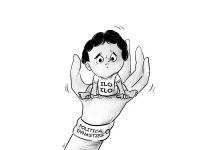
EARLY this year the pre-trial chamber of the International Criminal Court (ICC) authorized its prosecutor to resume its investigation on the war on drugs under the Duterte administration.
The Philippines appealed this decision to the ICC appeals chamber.
The Philippines also opposed the order allowing the victims to comment on its appeal.
In its decision published last week the ICC allowed victims and victim groups to comment on the appeal of the Philippine government.
***
The victims want to be heard because they have not been able to obtain justice and remedies for the crimes committed against their family members.
On the other hand, the Philippines demand the identification of the victims so there will be basis for them to present views and concerns.
The appeals chamber denied this demand because the verification process for validating the claims of the victims does not involve the Philippines. The Philippines as a state will not be jeopardized by its inability to access information on the victims.
***
The ICC hears criminal cases against individuals, not states.
A crime is committed by perps, not artificial persons.
For example, the elements of the “crime against humanity of murder” are the following:
1. The perpetrator killed one or more persons.
2. The conduct was committed as a part of a widespread or systematic attack against a civilian population.
3. The perpetrator knew that the conduct was part of or intended the conduct to be part of a widespread or systematic attack against a civilian population.
***
The term “killed” as an element of the offense is interchangeable with the term “caused death.”
It is not necessary that the perp do the actual killing for him to be indicted for crimes against humanity. It is enough that his actions caused death as part of a widespread attack.
***
To illustrate, should the ICC hear and decide the “one-time-big-time” drug operation conducted in Bulacan on August 16, 2017 as a crime against humanity, these elements may be dissected:
First, 32 people were killed overnight. Should police operations, being civilian operations, not result in death? Will the investigation negate the “nanlaban” narrative of the police?
Second, does the fact that the buy busts and raids were conducted simultaneously make them a “widespread or systematic attack” within the meaning of the Rome statute?
***
The ICC has been clear that the last element does not require proof that the perpetrator had knowledge of all characteristics of the attack or the precise details of the plan or policy of the State or organization.
The mental element, or the intent clause, is satisfied if the perpetrator intended to further such an attack.
This means that intent is implied from the perpetration of the offense.
***
The ICC has also clarified that “attack directed against a civilian population” means a course of conduct involving the multiple commission of acts in furtherance of a state or organizational policy to commit such attack.
The acts need not constitute a military attack. It only requires that the state or organization actively promote or encourage such an attack against a civilian population.
***
The tentacles of justice will not only bring perpetrators behind bars.
The families left behind by victims of the drug war can also pray for reparations before the ICC.
The Rome statute has established a trust fund for the benefit of victims of crimes and their families. The ICC may order that money collected through fines be transferred to the trust fund./PN







